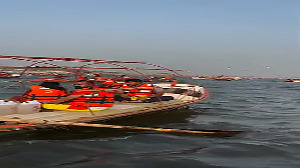

Am I entitled to know the truth or not?' asked a judge, after hearing incongruous and paradoxical arguments from a defendant and prosecutor.
'No, My Lord, you are supposed to know the evidence only,' replied the prosecutor.
The legal anecdote is relevant to the Godhra case.
Fifty-nine people were killed when Sabarmati Express compartment S-6 caught fire on February 27, 2002.
The incident returned to the spotlight with the release of the railway ministry's high-level committee's interim report drafted by retired judge, Justice Umesh Bannerji.
The report cannot be ignored as the committee may soon be converted into a full-fledged commission and may collide with the Nanavati Commission, which is also inquiring into the circumstance of the compartment fire.
A railway ministry official told rediff.com that the Bannerji Committee's terms of reference were different. "The Railways," he said, "being a huge commercial organisation, wants to learn lessons from the cause of fire and look into the safety angle. It is going ahead with the inquiry without pre-conceived notions that the compartment was set on fire."
The Gujarat government had asked the Nanavati Commission to probe the circumstances that lead to the 'setting of [the compartment on] fire.'
The United Progressive Alliance government took objection to the terms 'setting of fire' and by a Cabinet order formed the high-level committee.
It was not only Railway Minister Lalu Prasad Yadav's doing. The government's legal view was that the terms 'setting of fire' exposed the Narendra Modi government's bias and ruled out an accident.
Let's look at the two versions of the Godhra incident.
a. Justice Bannerji's report claims it was coincidence. The S-6 compartment caught fire accidentally from inside as the mob threw stones and acid bottles from outside. The Bannerji report claims that a half smoked cigarette or a stove used for making tea inside the compartment may have caused the fire. The report's conclusion is contrary to the Gujarat police's claim.
The report leads us to believe a Muslim gang/mob from Godhra did not torch the compartment and had no role to play in the death of the passengers, which led to riots against the community in Gujarat.
The presence of a mob outside the compartment that caught fire was coincidence, it claims.
b. Police investigations claim the molestation of a Muslim girl and skirmishes on the Godhra station platform, between tea vendors and kar sevaks, immediately after the arrival of the Sabarmati Express and later the burning of the compartment, was coincidence.
'Hindus started it, Muslims took it to climax'
The accused from Godhra had conspired to burn the compartment of kar sevaks, they claim. The burning of the compartment by Muslims had nothing to do with the molestation and vandalism by Hindus, they claim.
Both incidents are not inter-linked, the Gujarat police claimed. It was merely coincidence that the kar sevaks' vandalism attracted a Muslim crowd from a nearby colony and the 'conspirators' implemented their plans at that same time.
It is no surprise that statements by politicians on the Bannerji report serve their political interest.
The Congress party, the Left and leaders like Lalu were convinced much before the Bannerji report that either Godhra was an accident or it was the handiwork of the Sangh Parivar to win the assembly election in Gujarat.
The Bharatiya Janata Party alleges Lalu empowered the committee to give a clean chit to the Muslims and to help the accused in the case get bail since the Prevention of Terrorism Act has been repealed.
POTA Judge Sonia Gokani conducted the Godhra trial at the Sabarmati jail in Ahmedabad. But the Supreme Court stayed it, as it is hearing a petition by social activists to get it transferred outside Gujarat, for a fair trial.
The Bannerji report will be used by the Godhra accused as POTA is applicable only if the anti-national conspiracy charge is involved. If the accused get bail before the charges are formulated, it will be a setback for the police. The charges have not been formed due to the Supreme Court's stay.
Once the conspiracy charge goes, POTA goes. The trial will shift to an ordinary court, where the accused can get bail. Lower courts will take almost a decade to complete the hearing of 585 prosecution witnesses. Fast-track POTA courts will take about two years to hear all witnesses.
The BJP is upset over the trial's delay. A BJP spokesman said, "Do you mean to say Hindus have killed Hindus? Or did they commit mass suicide to help chief minister Modi win?"
But, the anti-BJP front also has questions.
Who benefited immensely from the conspiracy theory?
What is the proof beyond the confessional statements of the accused that it was a pre-planned act of a Muslim gang of Godhra?
In New Delhi, politicians in their party head offices are busy maligning the investigating authorities in off-the-record conversations with the media.
The Bannerji report has been termed advantageous to Lalu, to help him win the Muslims vote in Bihar, while the Nanavati Commission is considered too slow to be capable of imparting justice.
The Nanavati Commission's term ends in December but can be extended by the government.
The claim by Hazards Centre, a group of Delhi-based scientists, that 'the fire was most likely caused by an accident' cannot be taken seriously as it had no access to official records or evidence. It produced a well-argued, scientific theory and probability without considering the evidence.
rediff.com, in this series, presents evidence, not necessarily the truth, from police files in view of the Bannerji report's findings.
The evidence, in public domain, shows that till the court delivers its verdict on Godhra, it is best to hold back an opinion.
Part II: Questions about Godhra






 © 2025
© 2025